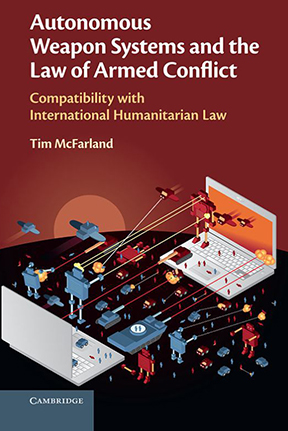Dr Tim McFarland, Research Fellow
 For some years now, countries around the world have been working to develop increasingly autonomous weapon systems (AWS) for use on future battlefields: that is, weapons which can do some of the job of selecting and attacking targets on their own, relieving humans of the need to manually perform every step of the process (as well as, perhaps, the need to closely supervise the weapons). The motivations for developing AWS include possibilities of enhanced operational effectiveness, force protection, financial savings and superior legal compliance, among others. However, they are also a source of considerable controversy, with calls for measures to ensure that ‘meaningful’ levels of human control are retained, or to impose moratoria on development, or even to put in place a complete pre-emptive ban. Whatever one’s personal views, it is difficult to deny the significance of this path of development, as a source of disagreement and international tension if nothing else. It is therefore troubling that the question of whether and how to regulate development and use of AWS is proving very difficult to answer.
For some years now, countries around the world have been working to develop increasingly autonomous weapon systems (AWS) for use on future battlefields: that is, weapons which can do some of the job of selecting and attacking targets on their own, relieving humans of the need to manually perform every step of the process (as well as, perhaps, the need to closely supervise the weapons). The motivations for developing AWS include possibilities of enhanced operational effectiveness, force protection, financial savings and superior legal compliance, among others. However, they are also a source of considerable controversy, with calls for measures to ensure that ‘meaningful’ levels of human control are retained, or to impose moratoria on development, or even to put in place a complete pre-emptive ban. Whatever one’s personal views, it is difficult to deny the significance of this path of development, as a source of disagreement and international tension if nothing else. It is therefore troubling that the question of whether and how to regulate development and use of AWS is proving very difficult to answer.
The international debate about regulating AWS development has been ongoing for approximately seven years in United Nations forums, and interest among policy-makers, academics and others had been growing for several years prior to the inception of the UN process. Sadly, progress has been sorely lacking. Far from reaching an accord about appropriate regulatory measures, participants remain mired in disagreement even about how to define AWS for the purposes of discussing whether and how to regulate them. Meanwhile, technological progress continues and the precursors to tomorrow’s highly autonomous weapons are gradually being integrated into modern armed forces. There is a real chance that, if current regulatory efforts stall, there will be no further opportunities for comprehensive international regulation beyond what is provided by existing law.
Of course, in a complex international political process, there are many factors which may contribute to a lack of consensus, such as State-specific strategic concerns, differing ethical stances and other matters. A striking feature of this debate, though, has been the persistence of conflicting views about the fundamental question of what ‘autonomous’ means in the context of weapon systems and other machines.
Read the full article at the Cambridge University Press blog.



